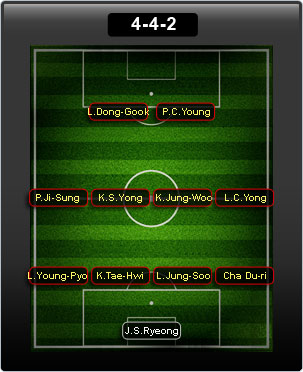
South Korea

Coach: Huh Jung-moo
Confederation: AFC
FIFA Ranking (Apr 10):47
Previous Appearances: 7 (1954, 1986, 1990, 1994, 1998, 2002, 2006)
Background
It was the 1954 World Cup in Switzerland where the Republic of Korea (Korea) made its first appearance in the grandiose tournament. However, they were overwhelmed in the tournament, losing to Hungary(9-0) and Turkey(7-0) in the first round.
It then took 32 years for the squad to reach the tournament again. In the 1986 World Cup in Mexico, Korea were grouped with Argentina, Italy and Bulgaria, and managed to finally earn their first point in the tournament after earning a draw with Bulgaria.
Based on this initial success, Korea went on to participate in seven consecutive World Cup finals from 1986 to the upcoming 2010 tournament in South Africa. Korea co-hosted the 2002 World Cup with Japan and shocked the world by becoming the first Asian team to reach the semi-finals.
In 2006 in Germany, Korea failed to reach the last 16. Korea beat Togo but lost to Switzerland and picked up a draw against France. It was somewhat disappointing for Korea as they were the only country who failed to qualify for the second phase despite earning +4 points in the group stage.
How They Qualified
Korea was grouped with Australia, Saudi Arabia, Iran and Japan in the Asian qualifying stage for 2010 World Cup. In the third round, Korea met North Korea, Jordan and Turkmenistan in Group 3. Though Korea disappointedly picked up two draws with its political enemy North Korea, it went up to the final round easily with the record of three wins and three draws.
In the final qualifying round, Korea was allocated a much harder group with two strong Middle Eastern squads (Saudi Arabia and Iran), traditional rivals (North Korea) and one dark horse (United Arab Emirates). Even though Korea started off with a disappointing 1-1 draw versus North Korea, it was smooth sailing from there and they won four out of their next five games to qualify for the World Cup.
Strengths
Korea has good team chemistry which is comes from the characteristics of the Korean people who like to focus on the co-workers and the community. Another strength is the players' hard work rate. Players like Park Ji-Sung are very diligent. Finally, Korea has many versatile players.
Defended set pieces has been a problem. The first choice goalkeeper (Lee Woon-Jae, 182cm) and two centre-backs, Cho Yong-Hyung(182cm) and Lee Jung-Soo(185cm) are relatively smaller than European players. Also there is a huge gap between regular players and substitutes in terms of performance. If the best goal scorer Park Chu-Young were injured, there is no proper replacement for him, and also Park Ji-Sung and Lee Chung-Yong in both wing positions are non-replaceable players too. Moreover, without Ki Sung-Yong there is no one who can dispatch the ball from the middle of the pitch to the frontline.
The Coach
Huh Jung-Moo was one of Korea's legendary players who had plied their trade in Europe (PSV) in early 80’s. As can be seen his nickname 'Jindo Dog', (Korea’s traditional dog famous with bravery) he has huge competitive spirit and is famous for his stern mentality. His team is hard to beat because he usually focuses on defence rather than offence. He established a 27-match unbeaten streak during his second stint in the Korean national team. (It ended in the friendly match against Serbia held in Craven Cottage in London mid November 2009)
Star Men
Park Ji-Sung (Manchester United)
Park Ji-Sung is famous for his high work rate as described by his nickname 'Three Lung Park'. As the most popular footballer in Korea, Park leads Korea's attack alongside with Park Chu-Young. Park had a few injures in the season just ended so should be fresh.
Park Chu-Young (AS Monaco)
Another Park who is much younger, Chu-Young has showed good performances as an ace in AS Monaco alongside with Nene. He also scored four goals in the World Cup qualifying stage. The first half of the season was impressive though of late, he has been hit by injuries.
Lee Chung-Yong (Bolton Wanderers)
The 21-year-old Bolton Wanderers' midfielder is one of the rising stars in Korean football. He played well in his debut season in the Premier League. He is known as the future of Korea who can cross the ball extremely well and is also able to help out in the goals department.
Best Footballing Moment
Of course, it was during the 2002 World Cup when Korea advanced to the semi-finals. However, most Korean fans remember and talk about the golden goal against Italy in the last 16 stage when ‘Lord of Ring’ Ahn Jung-Hwan kissed his ring after scoring in injury time.
Off The Pitch
Famous for: Nationalism. In Korea every sport as well as football has strong nationalistic ties so that most Korean fans are crazy at the international matches. In 2002, the fanatical Korean supporters in City hall’s square were a fresh shock to the world football fans and media.
Most likely to: Provide massive groups of people in red to be found everywhere in South Korea during 2010 World Cup period. And ‘Red Devils (nickname of Korean supporters) make the most noise out of any supporters in the world.
World Cup Objective
To advance to the last 16 for the first time in a tournament away from home soil. Previously in Germany, Korea almost reached the second phase but unfortunately failed to achieve their dream.


No comments:
Post a Comment